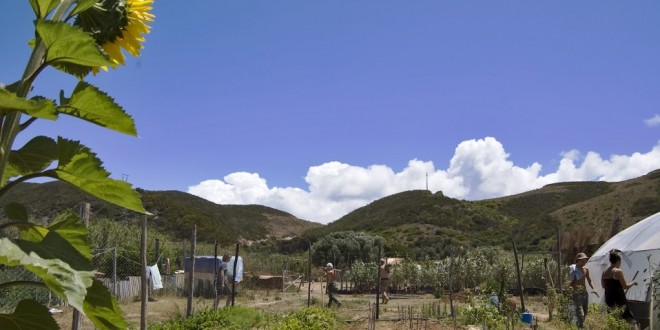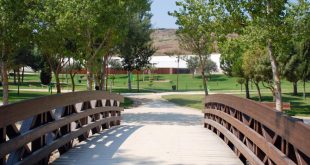ECO123 spoke to Rodrigo Rocha, the coordinator of WWOOF Portugal, who lives in Estremoz and Sagres. Rocha is 39 years old. Originally from Santos in Brazil, he came to Portugal when he was 17, studied geology in Coimbra, and completed his doctorate at the University of Évora. He is the father of twins, and he loves the sea.
ECO123: How did you become a founder member of WWOOF in Portugal, and how did WWOOF start in Portugal?
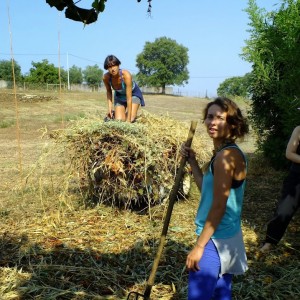 Rodrigo Rocha: The first time I heard anything about WWOOF was when a friend of mine was living and working on a farm near Beja, where wheat is cultivated organically. I saw a list of the countries in the world that you can travel to and where you can work without having to have money. I was fascinated. Then, about ten years ago, I registered my estate and what was my wonderful garden at that time. But I needed outside help with sowing and irrigation, signed up with WWOOF International and asked for support. Afterwards, I was invited to a European coordinators’ meeting in Germany. That’s where I first came into contact with coordinators from other countries. A lively exchange of experiences began to develop. That led to the plan to build WWOOF up in Portugal too. It reached that point in 2008 …
Rodrigo Rocha: The first time I heard anything about WWOOF was when a friend of mine was living and working on a farm near Beja, where wheat is cultivated organically. I saw a list of the countries in the world that you can travel to and where you can work without having to have money. I was fascinated. Then, about ten years ago, I registered my estate and what was my wonderful garden at that time. But I needed outside help with sowing and irrigation, signed up with WWOOF International and asked for support. Afterwards, I was invited to a European coordinators’ meeting in Germany. That’s where I first came into contact with coordinators from other countries. A lively exchange of experiences began to develop. That led to the plan to build WWOOF up in Portugal too. It reached that point in 2008 …
ECO123: …what does your work include? What do you do as coordinator? Do you earn any money from it?
Rodrigo Rocha: I have a contract with a small salary and do at least three hours’ work a day for WWOOF, seven days a week. That is also necessary because WWOOF has grown a lot in the past six years. This year, there are already 2,226 volunteers working in Portugal’s eco-agriculture. In 2013, there were about 1,600, in 2012, 1,416 came and in 2011 there were only 1,140 volunteers. We have a huge growth rate. Since 2011, the number of participants, both volunteers and farmers (hosts), has nearly doubled. (See statistics)
ECO123: Does WWOOF have an ethical framework that regulates the collaboration between volunteers and farmers? Are there cases where the system is abused?
Rodrigo Rocha: WWOOF works exclusively in ecological farming. One example. We had to exclude one farm when we received three complaints from volunteers if someone didn’t get enough to eat or had to work until they were exhausted. In the six years, we have only had two cases where there was a cause for conflict. One volunteer had stolen a car from a farmer, and drove across country in it. Then you have to call in the police.
ECO123: How old are the volunteers on average, where do they come from and what do they learn? What sort of farms can you apply to work on?
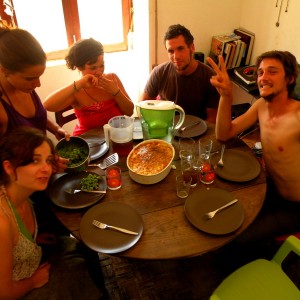 Rodrigo Rocha: Seventy percent of participants are between 20 and 30. They learn how to handle grapes on the vines, help with harvesting and later with pressing the grapes. They work on big farms and small, some of them just grow for their own consumption, and want to become self-sufficient, others sell their products on the market or to cooperatives. They grow vegetables such as tomatoes at a Quinta-Punk in Pedralva, which supplies a pizzeria. They also learn to handle animals, or to produce goat’s cheese. Others cultivate wheat and bake their own bread. They learn to work differently from the traditional system, they learn permaculture, eco-construction and energy production through renewable systems. People pay 15 euros, and can stay for two weeks, a month or several months, even as much as three years with a host. It is all coordinated on our website www.wwoof.pt. More than 50 percent of participants come from Germany, the UK, the USA, France, but also from Portugal itself, the Netherlands, Spain, Italy, Sweden and Canada.
Rodrigo Rocha: Seventy percent of participants are between 20 and 30. They learn how to handle grapes on the vines, help with harvesting and later with pressing the grapes. They work on big farms and small, some of them just grow for their own consumption, and want to become self-sufficient, others sell their products on the market or to cooperatives. They grow vegetables such as tomatoes at a Quinta-Punk in Pedralva, which supplies a pizzeria. They also learn to handle animals, or to produce goat’s cheese. Others cultivate wheat and bake their own bread. They learn to work differently from the traditional system, they learn permaculture, eco-construction and energy production through renewable systems. People pay 15 euros, and can stay for two weeks, a month or several months, even as much as three years with a host. It is all coordinated on our website www.wwoof.pt. More than 50 percent of participants come from Germany, the UK, the USA, France, but also from Portugal itself, the Netherlands, Spain, Italy, Sweden and Canada.
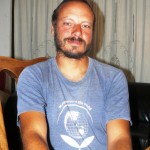 Rodrigo Rocha
Rodrigo RochaThis year, there are already 2,226 volunteers working in Portugal’s eco-agriculture. We have a huge growth rate.
 Eco123 Revista da Economia e Ecologia
Eco123 Revista da Economia e Ecologia

